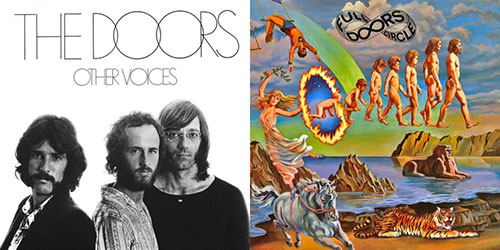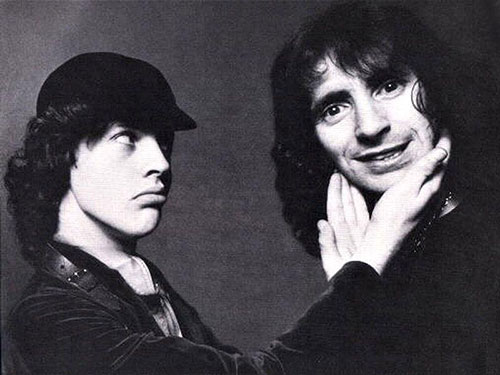Trippin' On A Hole In A Paper Heart
If Stone Temple Pilots were to continue on in the wake of Scott Weiland's death, it wouldn't be an unheard-of phenomenon. Just ask The Doors and Sublime.
"I mean Lou is a very talented guy, he learned how to write words when he was very young and he had an innate ability to adapt music to his needs and to create songs out of the notes that were available to him. But me, I had to learn it; it took me a lot of years to learn it. So I look at Squeeze as being, it’s like the equivalent of a tenth grade term paper, it’s a piece of work that I did, it’s not my best work, but it shows a lot of where I was going."
— Doug Yule, a member of The Velvet Underground during the latter part of its existence, discussing with PopMatters his reasoning for making Squeeze, the 1973 record that didn't feature any of the band's original members. It's been heavily criticized ever since its release, due to the fact that Yule appeared to be co-opting the band's name for his own purposes. But two things should be noted about this: First, if anyone was doing the co-opting, it was manager Steve Sesnick, who pushed Yule to do the record in the first place. And second, it should be noted that Lou Reed himself didn't appear that upset—he later asked Yule to perform on some of his solo records. (Reed left the band before the release of Loaded.)

The Doors made two studio albums after Jim Morrison died
With a personality as strong as Jim Morrison at the front of The Doors, it seems a little surprising that the band was able to keep going after Morrison died from an apparent heroin overdose in July of 1971.
But the band's three remaining members—Ray Manzarek, Robby Krieger, and John Densmore—were already back on store shelves that October, with a release titled Other Voices. The next year, they went Full Circle. The albums were recently re-released in a remastered two-CD set. In an interview with Billboard back in September, Krieger noted that the reason the records existed was because the band's members were unsure how else to handle the loss of Morrison.
"That was kind of a weird time, because it's really all we knew how to do," Krieger explained. "Obviously we weren't going to replace Jim, 'cause it wouldn't be fair to try and do that. So we had to make the decision—do we just give up and go our own ways, or, we had this great band musically and at that point we still got along really well and so we decided, 'Hey, let's just record this stuff and see how it turns out.'"
(They were also still fairly young—Krieger was just 25 at the time of Morrison's death.)
The albums get short shrift in terms of the Doors oeuvre, for understandable reasons—though songs like the post-Morrison single "Tightrope Ride" certainly are a lot stronger than you'd expect—but Krieger noted that there was a surprising amount of demand for the two records among fans, leading to the re-release.
Less successful as an artistic direction for the band was the decision in 1978 to take audio of Morrison doing poetry and have the surviving members of The Doors do musical backing. The resulting album, An American Prayer, sold well but was critically savaged.
The surviving members of The Doors, over the years, have found themselves attempting to balance this desire to keep the band awake while respecting the long shadow that hangs over the band. At one point, an attempted comeback created a rift among the surviving members due to the decision to include a new singer. The comeback eventually went on under a different name.
It'll be interesting if the remaining members of Stone Temple Pilots find themselves struggling with this balance as well.
Five notable attempts to bring a band back without its original lead singer
- The rock band Fuel created one of the most popular songs of the early 21st century, but that wasn't enough to keep Brett Scallions in the band. He left in 2006, at which point the band was so desperate to replace him that they were looking to American Idol for ideas. Scallions, meanwhile, became the lead singer of The Doors (yes, the same Doors we covered just a second ago), and later took over Fuel, replacing all the other members—one of whom, Carl Bell, wrote all the band's hits.
- Creedence Clearwater Revival defined the latter part of the 1960s, but the band broke up in a way that could charitably be called ugly. John Fogerty went on with his solo career afterwards, but the other surviving members of the band later launched a competing act called Credence Clearwater Revisited. Last year, those members sued Fogerty for trademark infringement after he correctly promoted himself as the former lead singer of Creedence Clearwater Revival.
- Sublime lead singer Bradley Nowell sadly wasn't even alive long enough to see his band break into the mainstream after his 1996 death from a heroin overdose. Bandmates Eric Wilson and Bud Gaugh, however, were—and in 2009, they attempted to re-form the band with a new singer, Rome Ramirez. Problem was, Nowell trademarked the name before he died, his family sued, and Sublime suddenly became Sublime With Rome.
- David Byrne was done with The Talking Heads. Unfortunately for him, the rest of the band wasn't, and they attempted to continue on as The Heads in 1996, going so far as to release an album called No Talking, Just Head, with celebrity vocals in Byrne's place. Byrne didn't like this, and he sued the band to get them to knock it off—though he dropped the suit after getting them to agree never to make another album. And that's why we don't have any more Talking Heads.
- Marc Bolan of T. Rex died way back in 1977, with an impressive body of work that touched on progressive folk and glam, among other genres. Mickey Finn, who played bongos with the band during its most popular period, created a follow-up tribute band called Mickey Finn's T-Rex, and though Finn died in 2003, the band continued for a while as Mickey Finn's T-Rex. These days, though, it's back to T-Rex.
160k

The Only Time a Lead Singer Replacement Seamlessly Worked
When it comes to bands that are best able to recover from a situation involving the death of a lead singer—or at the very least, a departure—the bands that stand the best chance of making it work are the ones that are creatively driven by a collaborative process.
(For what it's worth, Stone Temple Pilots was a fairly collaborative endeavor, with every member taking part in the songwriting process at various points.)
When Peter Gabriel left Genesis for a solo career in 1975, the band had a strong creative process in which every member played a role. Which meant that when Phil Collins became the singer, it actually kind of worked.

AC/DC, perhaps the most famous example of a popular band changing singers without losing a beat, was kind of the same way. Nearly all of their early hits were written by an effective trio of Angus Young, Malcolm Young, and Bon Scott. When Scott died, it certainly created a challenge for the band, but Brian Johnson was able to hop into the fray relatively easily, taking on a similar role as Scott's within the band's creative process. (It helped that Scott had directly pointed Johnson out to his bandmates before his death.)
Part of the reason for this was the fact that the band's surviving members were ultimately too restless to stop.
"I thought, 'Well, fuck this, I'm not gonna sit around mopin' all fuckin' year.' So I just rang up Angus and said, 'Do you wanna come back and rehearse?' This was about two days afterward," Malcolm Young said in a 1980 interview with Rolling Stone.
(Likewise, when Malcolm had to leave the band due to dementia last year, it didn't stop the band.)
There are other bands that have managed to plow through this kind of situation in the past, but few have managed to do it as seamlessly as AC/DC. It wasn't like Van Halen and its revolving door of lead singers; it was still the same kind of band afterwards.
Stone Temple Pilots had already let Scott Weiland go two and a half years before his death last week.
But from a purely fan-centric perspective, there was still hope that Weiland and his bandmates would work things out in time for the inevitable reunion tour. Now, that opportunity is gone, and it could be a long road for the DeLeo brothers from here.
Whatever happens next, one thing I think most of us can agree on is this: Hard drugs suck, and they ruin lives long before those lives expire. Rolling Stone did music fans a favor earlier this week when it gave Mary Forsberg Weiland, Scott's ex-wife, a place to put all this stuff into perspective.
"Let's choose to make this the first time we don't glorify this tragedy with talk of rock and roll and the demons that, by the way, don't have to come with it," she wrote in an essay that pointed out Weiland's failings as a father and husband. (You should read the piece. It's heartbreaking.)
Just because Weiland's dead doesn't mean his memory should be for sale.
:format(jpeg)/2018/11/pjkncdbw8bf0rrohbsxq--1-.gif)
/2018/11/pjkncdbw8bf0rrohbsxq--1-.gif)

/uploads/ernie_crop.jpg)